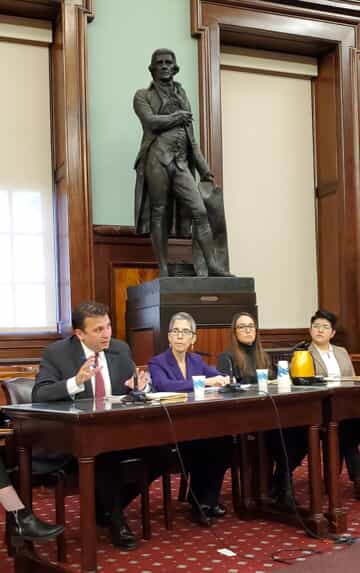The mission of the NYPD, which is prominently displayed on its website and in its precincts throughout all five boroughs “is to enhance the quality of life in New York City by working in partnership with the community to enforce the law, preserve peace, protect the people, reduce fear, and maintain order.” The importance of maintaining a “partnership with the community” is reflected in the city’s policies protecting its immigrant communities. New York City’s policies that collectively aim to prohibit local law enforcement from acting as an extension of ICE reflect the values of a city that has enormous respect and appreciation for the contributions of its immigrant population.
The impact immigrants have on the city’s financial, cultural, and technological foundations cannot be overstated and have been testified about many  times before this body. Contributions in these areas are what makes New York City thrive and a place that is the true envy of the world. But just as important of a contribution is the partnership immigrant communities have developed with the New York City Police Department (“NYPD”). It is a relationship that has proven essential to the department’s mission to preserve peace, protect people, reduce fear, and maintain order. And it is a relationship that is under attack from a federal agency whose goals directly conflict with the concept of community engagement that is at the heart of the NYPD’s mission statement.
times before this body. Contributions in these areas are what makes New York City thrive and a place that is the true envy of the world. But just as important of a contribution is the partnership immigrant communities have developed with the New York City Police Department (“NYPD”). It is a relationship that has proven essential to the department’s mission to preserve peace, protect people, reduce fear, and maintain order. And it is a relationship that is under attack from a federal agency whose goals directly conflict with the concept of community engagement that is at the heart of the NYPD’s mission statement.
ICE already has overreaching powers. ICE’s policy of permitting its officers to identify themselves as “police officers” is a brazen attempt to deceive our immigrant population into believing they are part of the same city police department that relies on their support and cooperation. This deception results in an environment that directly undermines the relationship between local law enforcement and our immigrant communities, which thrives on mutual feelings of respect and trust. ICE’s actions do not preserve peace within our communities but destroy it. They do not instill a sense of order, but chaos. And they do not reduce fear, but enhance it. How can members of the immigrant community be expected to voluntarily come forward as a witness to or victim of a crime after seeing family members and friends dragged away by an ICE officer who had identified themselves as a police officer? Why would they possibly report unsafe working or housing conditions when they believe doing so will cause “the police” to detain them for overstaying a visa? Is it any wonder why so many immigrants now choose to not attend even basic traffic court hearings, when they believe “the police” will now take them into custody before they even enter the courtroom?
ICE’s policies also create access to the health care crisis. In a time where the national and local conversation is centered around the need for more accessible health care, ICE’s deceptive methods prevent that from becoming a reality. The safety and security of many of this city’s hospitals is overseen by its great police force. In deliberately placing ICE agents who identify themselves as police officers within pools of officers that protect those hospitals, the waters become muddied. The rationale behind the immigrant population’s reluctance to cooperate with local criminal investigations naturally extends to decisions regarding medical treatment for themselves or loved ones. A decision to go to the emergency room should be made solely on whether it is medically necessary and not whether it will lead to an immigration enforcement action.
City resolutions aimed at restricting these predatory and harmful policies are, unfortunately, one of a what is an extremely limited amount of options in reigning in ICE’s power. The reality is that there is very little oversight of ICE’s methods of enforcement at the local level. As an agency that is under the jurisdiction of the same branch of government that appoints the nation’s immigration judges, there is simply no adjudicating body that can realistically demand accountability. And until the federal government acts and implements an independent Article I immigration judiciary, it is resolutions like this that must be relied on.

